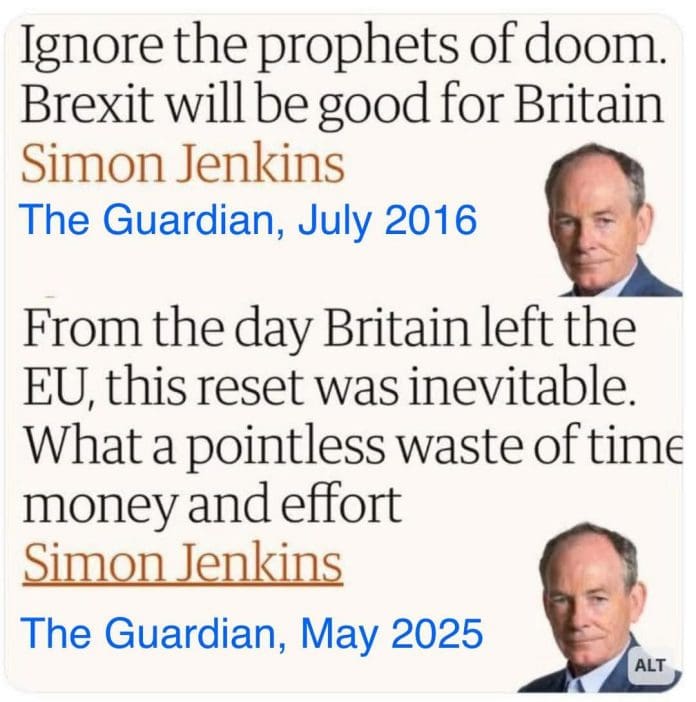When the UK voted to leave the European Union in 2016, the promise was simple: “Take back control” of borders, laws, and trade. Yet nearly a decade later, that decision continues to reverberate in unexpected and often unwelcome ways. Two prominent and seemingly separate issues, an increase in small boat migrant crossings and a stagnating UK economy, can both be traced back, in significant part, to the aftershocks of Brexit.
Part I: How Brexit Fuelled the Rise in Small Boat Crossings
End of EU Agreements
Prior to Brexit, the UK was part of the Dublin Regulation, an EU-wide mechanism that allowed member states to return asylum seekers to the first safe EU country they entered. After leaving the EU, the UK lost access to this legal framework and has since failed to negotiate a similar bilateral agreement with the bloc or its members. This legal vacuum has made it significantly harder for the UK to return migrants who arrive illegally, especially those crossing the English Channel in small boats.
Fewer Legal Routes, More Irregular Journeys
Brexit also brought an end to the free movement of people. While politically popular among many voters, this change reduced legal pathways for EU citizens, many of whom previously came to the UK for work. With growing labour shortages (especially in sectors such as agriculture, social care, and hospitality), the incentive for irregular migration has increased. Criminal networks have stepped in to meet demand, profiting from smuggling operations across the Channel.
Strained Franco-British Relations
Relations between the UK and France, already frayed by Brexit, have further deteriorated over how to manage Channel crossings. Without the mutual trust and legal frameworks once provided by EU membership, cross-border cooperation on enforcement, intelligence sharing, and joint patrols has become politicised and less effective.
Man in blue and white, "About Reform, do I smell a bit of BS?" #BBCQT
— Farrukh (@implausibleblog) June 12, 2025
"Because Reform are trying to tell us to trust you, the Farage show"
"It's the guy who advocated for Brexit, let's not forget that"
"Why is the economy in the state that it is now? Brexit" pic.twitter.com/ZXaYcGgbke
Part II: Brexit and the Decline of the UK Economy
New Trade Barriers and Lost Markets
The UK’s departure from the EU single market and customs union introduced non-tariff barriers, such as customs declarations, regulatory divergence, and increased paperwork. These changes have disrupted trade, particularly for small and medium-sized enterprises, many of which have either scaled back or stopped trading with the EU due to cost and complexity.
According to the Office for Budget Responsibility (OBR), Brexit is expected to reduce the UK’s long-term productivity by 4%, a substantial blow to economic growth.
Labour Shortages and Inflation
Brexit contributed to labour shortages by ending the free movement of EU workers. Key sectors such as food processing, logistics, health and social care, and construction have all struggled to recruit staff. While the UK introduced a points-based immigration system, it has been less responsive and more bureaucratic than the previous system.
These shortages have fed into wage pressures, higher costs, and supply chain delays—contributing to inflation and lower productivity.
Investment and Growth Decline
Brexit created uncertainty around trade, regulation, and long-term access to EU markets. This has made the UK a less attractive destination for foreign direct investment (FDI). Investment growth in the UK has significantly underperformed compared to other G7 countries since 2016. Additionally, the loss of access to EU funding for science, research, and infrastructure projects has further undermined economic resilience and innovation.
In summary, Brexit was never solely about immigration or economics, but both were central to the campaign and its aftermath. Ironically, instead of “taking back control,” the UK has lost key mechanisms for managing both migration and economic performance. The rise in small boat crossings and the sluggish state of the UK economy are not separate crises; they are interconnected symptoms of the same strategic rupture.
Unless new arrangements are reached, whether through closer cooperation with the EU on asylum and border management or a more pragmatic approach to trade and immigration, these twin challenges are likely to deepen in the years ahead.







